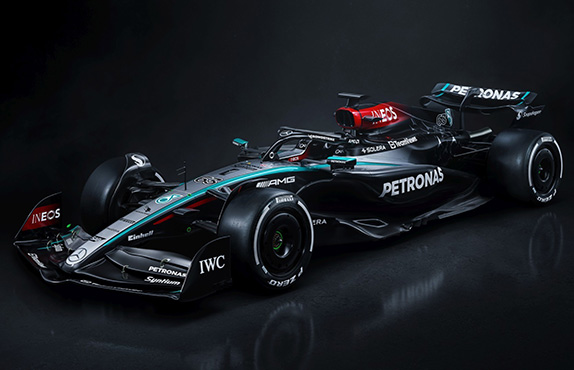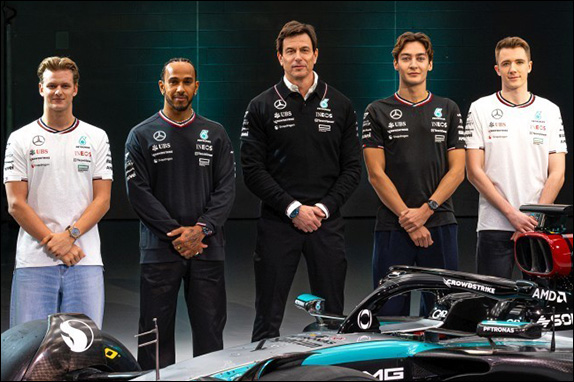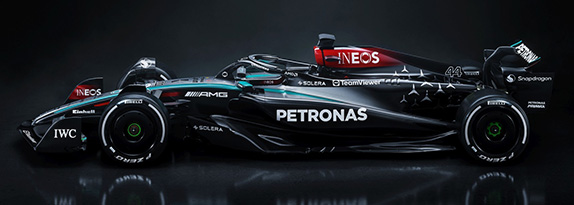Mercedes traditionally presented a new car at Silverstone and organized a live broadcast on social networks.
But the situation was uncomfortable for the team. For the first time in many years, the team knew that after the season it would lose its leader, seven-time world champion Lewis Hamilton, who had a contract until 2025, but with an option to terminate, which the Briton exercised. by agreeing with Ferrari.
Only a fight for the title can restore Mercedes’ confidence; for this, the team changed a lot, made personnel changes, opted for a different approach to developing the car, but the rivals did not stand still.
Photo gallery: Presentation of Mercedes AMG W15
Toto Wolff, team leader: “We know that we have to do a lot to fight for leadership again. The off-season went well, the whole team is focused on the work and determined to achieve the goal.
Miracles do not exist in our sport. But we count on the results of our work. Since we changed the philosophy of the car, the development of the project has been in full swing. We had a number of priority tasks, we will soon find out if we were able to take the step we were aiming for.
I believe the last two years have been necessary to recalibrate, recalibrate and reinvent ourselves in some areas. This approach is never easy. But we have made progress and look forward to the next step with the new W15. It’s not a linear path, but when we stumble, we pick ourselves up and keep climbing.
When we chose the black color scheme last year, efficiency was a top priority. Weight is a decisive factor for this generation of cars. We knew that, as soon as the opportunity arose, we would bring back the silver color of Mercedes, alongside the black that has become the core of our team’s identity.”

James Ellison, technical director: “The development of any machine is a long process and divided into phases. It started last year and the creation of a new car allows the team to make significant changes to the design, which is impossible during the season. Decisions on these changes were made last summer.
A big part of our focus was on improving the car’s performance on the track, as the rear end of last year’s W14 was unpredictable. We have gone to great lengths to ensure that both axles, especially the rear, allow better control of the tires than was the case on the previous chassis.
We also resolved other issues – in areas where we needed to improve, including improving the efficiency of the DRS system and improving pit stops.
But the speed of cars of this generation largely depends on how the soil works, how it interacts with the track. Whether a chassis is efficient or not is determined by how the underbody functions aerodynamically.
We believe that we have worked fruitfully this winter, but in Formula everything is relative and only time will tell how far we have managed to progress. Now our main task is to learn how to fully utilize the car’s potential, but we are inspired by the prospect of participating in the upcoming modernization race, because these regulations are not yet outdated and offer many opportunities.”

Lewis Hamilton: “Everything we have learned over the past two years has helped us find the right direction, find our ‘north star’. The work is still ongoing, but we will face any difficulties.
If the driver feels uncomfortable in the car, he cannot get maximum performance from it. However, a more stable and predictable car will allow not only its potential, but also the potential of the racers to be fully revealed.
I know what the team is capable of and I am very grateful to all employees for their work. Every time I stand at the base, I see the dedication with which everyone works. We are extremely motivated for the coming season and are ready to give the best of ourselves.”
George Russell: “We have learned a lot and grown as a team over the past two seasons. We have overcome a difficult path, but I believe the challenges we have overcome will make us stronger in the long run. The entire team has worked hard and we hope that we have been able to take a step forward with the W15.
Last year, progress was made in correcting the W14’s most unpleasant features. However, the car still had a small range, and when out of range it was difficult to drive. If the range of the new car turns out to be greater, this will give confidence to the drivers and it will be easier for us to regain the lap time.
Formula 1 is incredibly difficult. It’s hard to win, but that’s why we love this sport. Every woman and man at the Brackley and Brixworth bases is focused on getting back to the top. We will continue with the same dedication in 2024. Let’s see what results this will lead us to.”

Technical characteristics of Mercedes AMG W15
Chassis
Monocoque: Monocoque made of carbon fiber and composite materials with honeycomb structure
Frame: Engine housing, side pontoons, underbody, nose cone, front and rear fenders made of carbon fiber
Cockpit: Removable anatomical carbon fiber racer seat, six-point seat belts, HANS system
Security structures: Safety cage integrated with crash resistant structure and drive-through panels, front crash structure, regulatory side impact components, integrated rear crash structure, front and rear roll mitigation elements. Titanium head protection system (Halo)
Front suspension: Carbon crossmembers and pushrods work together with springs and shock absorbers
Rear suspension: Carbon fiber crossbars and pushrods work together with internal springs and shock absorbers
Wheel discs: BBS, forged, magnesium alloy
Tyres: Pirelli.
Brake system: Carbon wheels and linings from Carbone Industries, electronic rear brake control
Brake calipers: Brembo
To steer: Rack type with amplifier
Send: Carbon fiber construction
Electronics: FIA certified standard ECU and electrical system
Dashboard: McLaren electronic systems (MES)
Fuel system: ATL, Kevlar reinforced rubber fuel tank
Fuels and lubricants and technical fluids: Petronas Tutela.
Transfer
Transfer: 8 gears, single reverse, carbon body
Checkpoint Control: Sequential, semi-automatic, hydraulic drive
Clutch: Carbon disk
Dimensions
Total length: More than 5000 mm
Width: 2000mm
Total height: 970mm
Total weight: 798 kg
PowerPoint
Type: Mercedes-AMG F1 M15 E Performance
Minimum weight: 150kg
Powertrain components: combustion engine (ICE), kinetic engine generator (MGU-K), thermal engine generator (MGU-H), turbocharger (TC), battery (ES), control electronics (CE)
Each racer will receive four combustion engines, four turbochargers, four MGU-H and MGU-K, two batteries and two control electronics units for the season
Combustion engine
Work volume: 1.6 l
Amount of cilinders: 6
Camber angle: 90 degrees
Number of valves: 24
Maximum crankshaft speed: 15000 rpm
Maximum mass fuel consumption: 100 kg/hour at speeds higher than 10500 rpm
Fuel system: direct injection at 500 bar pressure, one injector per cylinder
Turbocharger: single-stage compressor and turbine operating on exhaust gases, driven by a single shaft.
Maximum rotation speed of the turbine: 125000 rpm.
Energy Recovery System (ERS)
ERS: Integrated hybrid energy recovery system based on motor generators
Energy storage: Lithium-ion batteries, minimum weight 20 kg in accordance with legal requirements
Maximum energy stored by the battery in one lap: 4 MY
Maximum speed MGU-K: 50000 rpm
Maximum power of MGU-K: 120 kW (161 hp)
Maximum amount of energy regenerated by MGU-K: 2 MJ per round
Maximum amount of energy supplied by the MGU-K motor generator: 4 MJ per lap (for 33.3 seconds at full power)
Maximum speed of thermal engine generator (MGU-H): 125000 rpm
Maximum power MGU-H: Not limited
Maximum energy regenerated by MGU-H in one round: Not limited
Maximum energy yield by MGU-H in one round: Not limited
Fuel: Petronas Primax
Lubricants: Petronas Syntium
Source: F1 News
I am Christopher Clyde, an experienced journalist and content writer with a passion for sports. I have been writing about Formula 1 news for the past five years and am currently employed as an author at athletistic.com, one of the top sports websites in the US.


